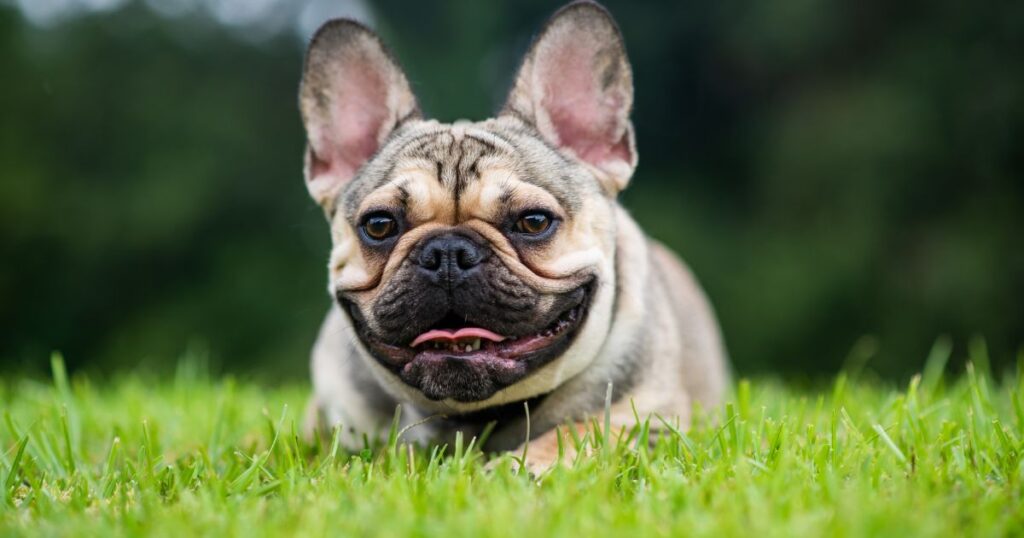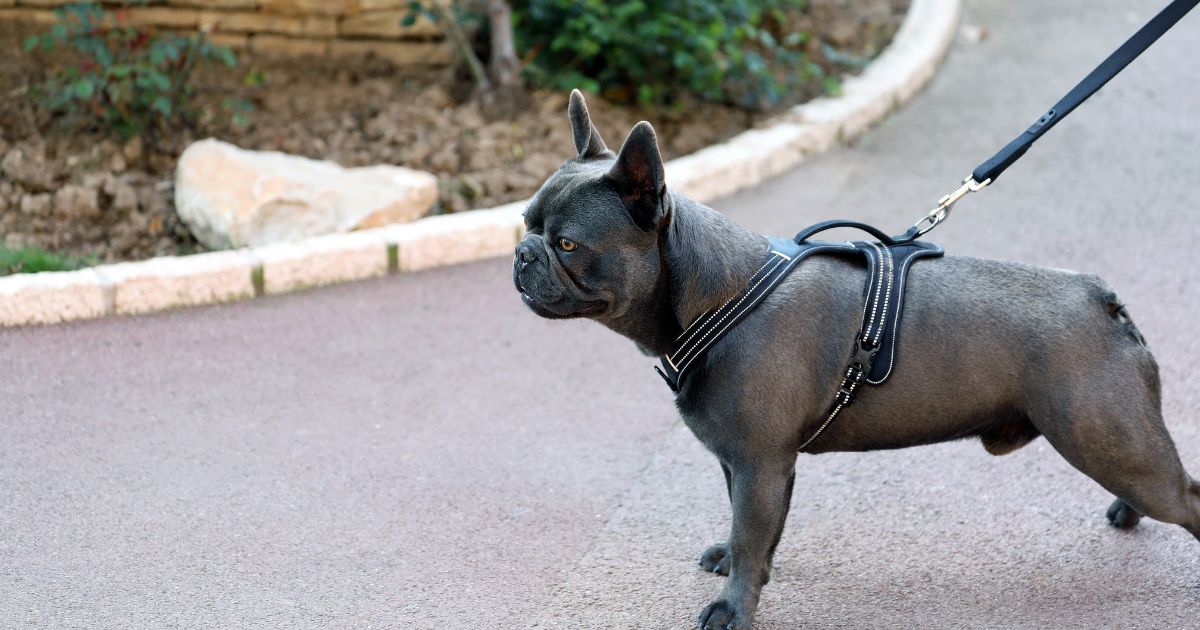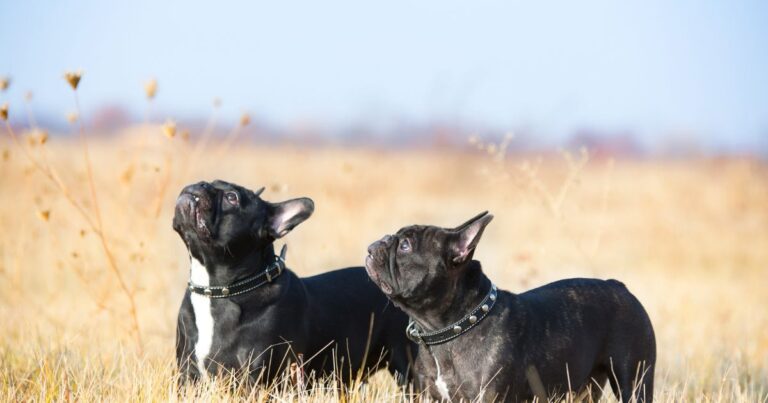French Bulldog Breed Characteristics & Breed Information
Table of Contents
Hello, fellow Frenchie lovers! Ever wondered what makes the French Bulldog so unique and lovable? From their bat-like ears to their playful personality, Frenchies are a breed like no other. Dive in to discover the fascinating characteristics of these adorable companions!
Introduction
The French Bulldog, affectionately known as the Frenchie, is a small breed dog with a big personality. This breed, a mix of British and French origins, has seen a rapid rise in popularity, becoming the second most commonly registered pedigree breed in the UK by 2017. Let’s dive into the unique characteristics of this lovable breed, from its distinctive bat-like ears to its playful and adaptable nature.
A French Bulldog is like a great bottle of wine, they just get better and better over time.

History of the French Bulldog
The French Bulldog has a rich history that dates back to the 19th century. Despite its Gallic name, the breed has roots in the Toy Bulldog of Britain in the 1850s. The breed was introduced to Northern France during the Industrial Revolution, where it was crossed with other brachycephalic (short-muzzled) breeds, resulting in the French Bulldog breed as we know it today. The breed was first formally recognized by The Kennel Club in 1906 and has since seen a dramatic rise in popularity, with a thirtyfold increase in registrations over the past decade. History and Origin of French Bulldogs
French Bulldog Characteristics
| Characteristic | Description |
|---|---|
| Size | Small |
| Lifespan | 10-12 years |
| Exercise Needs | Low |
| Grooming | Low |
| Temperament | Affectionate, Playful, Alert |
| Good with Children | Yes |
| Good with other Pets | Yes |
Why Choose a French Bulldog?
With their affectionate nature and adaptable temperament, French Bulldogs make excellent pets. They are sociable and friendly, making them great companions for both individuals and families. Their small size makes them suitable for both apartment living and houses with yards. If you’re looking for a pet that’s full of personality and love, the French Bulldog could be the perfect addition to your family.
The Physical Traits of French Bulldogs
From their bat-like ears to their compact, muscular build, French Bulldogs are instantly recognizable. But did you know they have some unique physical traits that set them apart? The most common colors of French Bulldogs are brindle (solid or main) and fawn (solid or main), making up 32.36% and 29.9% of the breed respectively. Their distinctive features, combined with their iconic, compact size, make them a truly unique breed. Unraveling the Physical Traits of French Bulldogs
Are Frenchies Born with Tails?
One of the most common questions about French Bulldogs is about their tails. Unlike some other breeds, French Bulldogs are indeed born with short, stumpy tails. They are not docked or cut in any way, as is the case with some other breeds. The tail is naturally short and curls up over the hindquarters. Are Frenchies born with tails?
Can Frenchies Breed Naturally?
French Bulldogs have a unique physique that can affect their breeding. Due to their narrow hips, French Bulldogs often have difficulty mating naturally. In many cases, breeders must resort to artificial insemination to ensure a successful breeding. Additionally, the breed’s small size and the puppies’ large heads often necessitate that births happen via Caesarean section to prevent complications. Can Frenchies breed naturally?

The Frenchie Personality
French Bulldogs are known for their playful and adaptable nature. They are friendly and sociable, making them excellent companions. Despite their small size, they have a big personality and are known for their affectionate nature and strong bonding with their families. They are also known for their energetic and active behavior, making them a fun and engaging pet to have around. The Frenchie Personality: Unraveling the French Bulldog Temperament
Frenchie Intelligence
Originally bred as companion dogs, French Bulldogs might not have a job to do, but they still love to keep their minds active. Without mental stimulation, they might resort to behaviors like digging or chewing. Interactive dog toys, obedience training, and even dog sports like agility can provide the mental workout they need.
Potential for Mouthiness
French Bulldogs, especially as puppies, can be a bit mouthy. They might nip or play-bite, which is usually harmless but should be discouraged. Training and redirection to chew toys can help manage this behavior. A game of fetch or a good chew toy can be a great outlet for a mouthy Frenchie.
Prey Drive
While not as high as in some breeds, French Bulldogs do have a prey drive. They might be tempted to chase smaller animals like squirrels or cats. Always supervise your Frenchie when they’re off-leash outdoors, and ensure your yard is securely fenced.
Tendency to Bark or Howl
French Bulldogs aren’t known for excessive barking or howling, but they will certainly make their voices heard when they want attention or if something is amiss. If you live in an apartment or have close neighbors, a Frenchie’s moderate vocalization shouldn’t be a problem.
Wanderlust Potential
French Bulldogs are less prone to wanderlust than some breeds, but they’re still curious and might be tempted to explore if given the chance. Always keep your Frenchie on a leash or in a secure area when outside.
French Bulldog Behavior Problems
Like all dogs, French Bulldogs can have their share of behavior problems. Some of the most common issues include separation anxiety, stubbornness, and excessive barking. However, with proper training and socialization, these issues can be managed effectively. It’s important to remember that every dog is unique, and what works for one might not work for another. French Bulldog Behavior Problems

Are French Bulldogs Easy to Train?
Training is an important part of owning any dog. French Bulldogs are known for their intelligence, but they also have a reputation for being a bit stubborn. This can make training a challenge at times. However, with patience, consistency, and positive reinforcement, French Bulldogs can be trained effectively. They respond well to reward-based training methods and can learn a wide range of commands and tricks. Are French Bulldogs easy to train?
French Bulldog Training Needs
| Training Need | Description |
|---|---|
| Obedience | Moderate |
| Socialization | High |
| Exercise | Low |
| Mental Stimulation | Moderate |

French Bulldog Exercise Needs
Assessing Their Energy Level
Dogs can range from high-energy dynamos to low-energy loungers. High-energy dogs, often bred for tasks like hunting or herding, possess the stamina for a full day of activity. They require ample exercise and mental stimulation, often seen jumping, playing, and exploring their surroundings.
On the other hand, low-energy dogs are content with a more relaxed lifestyle, happy to spend their day dozing. When choosing a breed like a French Bulldog, consider your lifestyle and activity level. It’s important to determine whether a lively, energetic dog would be invigorating or overwhelming for you.
Evaluating Their Intensity
Intensity in a dog doesn’t necessarily correlate with their energy level. Intense dogs approach life with vigor, whether it’s straining on a leash, attempting to overcome obstacles, or eating and drinking with enthusiasm. These spirited canines often require extensive training to learn good manners and might not be the best fit for a home with young children or elderly individuals. A dog with low vigor, conversely, has a more laid-back approach to life.
Determining Their Exercise Needs
Different breeds have varying exercise needs. Some are content with a leisurely evening walk, while others require daily, vigorous exercise, especially those breeds originally developed for physically demanding jobs like hunting or herding.
Insufficient exercise can lead to weight gain and undesirable behaviors like barking, chewing, and digging in these breeds. Breeds requiring a lot of exercise are well-suited to active individuals or those interested in training their dog for high-energy dog sports, such as agility.
Top 5 Considerations for Potential French Bulldog Owners
- They can have potential health issues, especially related to their respiratory system.
- They need regular grooming to keep their coat healthy.
- They can be stubborn, so they need consistent training.
- They’re not the best breed for very active people as they prefer a more relaxed lifestyle.
- They can be sensitive to extreme temperatures.
Gauging Their Playfulness
Playfulness varies among dogs. Some remain playful puppies throughout their lives, always eager for a game, while others are more serious and calm. While a playful pup might sound appealing, consider how many games of fetch or tag you’re willing to play each day. Also, consider whether you have children or other dogs who can serve as playmates for your Frenchie.
Health and Grooming Needs of a French Bulldog
Shedding
French Bulldogs are moderate shedders. You’ll find some hair on your clothes and around your home, but it’s nothing a good vacuum can’t handle. Regular brushing can help manage shedding and keep your Frenchie’s coat healthy. If you’re a neatnik, you might need to adjust your expectations or invest in a good de-shedding tool.
Drooling Potential
French Bulldogs aren’t known for excessive drooling. However, they might slobber a bit more in hot weather or after drinking water. If you’re not a fan of drool, a Frenchie’s relatively low slobber level could be a plus.
Grooming
French Bulldogs are relatively easy to groom. Their short coat requires minimal brushing, and they only need occasional baths unless they’ve gotten into something messy. Regular nail trims and ear cleanings are also important for their overall health.
General Health
Like all breeds, French Bulldogs are prone to certain genetic health conditions. Hip dysplasia, brachycephalic syndrome, and certain skin conditions are among the issues that can affect this breed. If you’re adopting a Frenchie puppy, it’s a good idea to check the health of the pup’s parents and ask about any potential genetic illnesses.
French Bulldog Health Concerns
| Health Concern | Description |
|---|---|
| Hip Dysplasia | Common in many breeds, this condition occurs when the hip joint is malformed, leading to arthritis or lameness. |
| Brachycephalic Syndrome | This syndrome is common in breeds with short heads and can lead to breathing difficulties. |
| Skin Conditions | French Bulldogs can suffer from a variety of skin conditions, including allergies and eczema. |
Health and Lifespan of the French Bulldog
Like all breeds, French Bulldogs have specific health considerations and a typical lifespan. French Bulldogs are prone to several health issues including ocular, respiratory, neurological, and dermatological problems. The most common health issues include otitis externa, diarrhoea, and conjunctivitis. Despite these potential health issues, with proper care and regular veterinary check-ups, French Bulldogs can live healthy lives.

All-Around Friendliness of a French Bulldog
Affectionate with Family
French Bulldogs are known for their affectionate nature. They form strong bonds with their families and are known to be particularly good companions. While some breeds may be aloof or bond closely with one person, Frenchies tend to shower their whole family with love. Of course, individual dogs may vary, and a Frenchie’s upbringing and socialization can also influence their affection levels.
Kid-Friendly
French Bulldogs are generally good with children. They’re sturdy enough to handle the enthusiastic play that kids can dish out, and they typically have a patient and easygoing nature. However, it’s important to remember that all dogs, regardless of breed, should be supervised when interacting with young children to ensure the safety of both the child and the dog.
Dog Friendly
French Bulldogs can be friendly with other dogs, especially if they’ve been socialized from a young age. However, like all breeds, individual Frenchies may vary in their tolerance of other dogs. Some may prefer human company, while others enjoy the company of their canine peers. Early socialization and positive experiences with other dogs during puppyhood can help a Frenchie develop good canine social skills.
Friendly Toward Strangers
French Bulldogs can be quite friendly toward strangers, although this can depend on their individual personality and socialization. Some Frenchies might be a bit reserved at first, but they usually warm up quickly. A well-socialized Frenchie will typically respond well to new people. However, it’s always important to keep any dog, even the friendliest, on a leash in public for their safety and the safety of others.

Adaptability of a French Bulldog
Adapts Well To Apartment Living
French Bulldogs are often considered one of the best breeds for apartment living. Their small size and lower energy levels make them well-suited to smaller spaces. However, it’s not just their size that makes them great apartment dogs. Frenchies are also known for their relatively quiet nature, which is a big plus when you have close neighbors. They’re typically polite when encountering others in shared spaces, making them a good choice for maintaining a harmonious apartment environment.
Good For Novice Owners
French Bulldogs are often recommended for first-time dog owners. They’re generally easygoing, resilient, and take well to training. While some breeds might be too sensitive or assertive for a novice owner, Frenchies are usually quite manageable. Of course, it’s always important for any new dog owner to be prepared for the responsibilities of dog ownership and to provide consistent, positive training.
Sensitivity Level
French Bulldogs have a moderate sensitivity level. They’re not overly sensitive, but they do appreciate a consistent routine and a calm environment. They’re typically quite resilient and can adapt to different situations, making them a good choice for families with a somewhat hectic lifestyle.
Tolerates Being Alone
While French Bulldogs form strong bonds with their families, they’re also known to be fairly independent. They can tolerate being alone for short periods, but like all dogs, they shouldn’t be left alone for extended periods. If left alone too long, they can become anxious and potentially destructive.
Tolerates Cold Weather
French Bulldogs have a short coat and are not particularly suited to very cold climates. In cooler weather, they may need a doggy sweater or jacket to keep them warm during walks. Always monitor your Frenchie in cold weather to ensure they’re comfortable and not showing signs of being too cold.
Tolerates Hot Weather
French Bulldogs are brachycephalic, meaning they have a short nose and flat face. This can make them more susceptible to overheating in hot weather. If you live in a hot climate, you’ll need to ensure your Frenchie stays cool, avoid walking them during the hottest parts of the day, and always provide plenty of fresh water.

Top 5 Reasons to Love French Bulldogs
- They’re incredibly affectionate and love to cuddle.
- They have a low need for exercise, making them great for apartment living.
- They’re known for their playful and alert temperament.
- They’re good with children and other pets.
- They have a unique and adorable appearance that’s sure to turn heads.
Caring for a French Bulldog
Owning a French Bulldog comes with certain responsibilities to ensure their health and happiness. Regular exercise, a balanced diet, and regular vet check-ups are crucial for their well-being. Due to their brachycephalic nature, they are prone to overheating, so it’s important to provide them with a cool environment, especially during hot weather. Regular grooming is also necessary to keep their coat healthy and clean.
The French Bulldog is a clown in the cloak of a philosopher.
Conclusion
The French Bulldog is a breed like no other, combining a distinctive appearance with a lovable personality. Their compact size, playful nature, and affectionate temperament make them a favorite among dog lovers. Whether you’re looking for a loyal companion or a family pet, the French Bulldog is a breed that’s sure to bring joy and companionship into your life.
Call to Action
Interested in learning more about French Bulldogs or other breeds? Visit our Breed Characteristics category page for more in-depth information. If you’re considering adding a Frenchie to your family, remember to adopt responsibly and consider the unique needs of this special breed. And as always, feel free to reach out with any questions or comments. We’re here to help you make the best choice for your family and your future pet.
Frequently Asked Questions
What is the lifespan of a French Bulldog?
French Bulldogs typically live between 10 to 12 years. However, this can vary depending on their health and lifestyle.
Are French Bulldogs good with children?
Yes, French Bulldogs are known to be very friendly and gentle with children. They are also sturdy enough to handle the playful nature of kids.
Can French Bulldogs live in apartments?
Yes, French Bulldogs are known to adapt well to apartment living. They are relatively low-energy and quiet, making them suitable for such environments.
Do French Bulldogs shed a lot?
French Bulldogs have a short, fine, smooth coat that is easy to groom. They are average shedders and regular brushing can help manage this.
Are French Bulldogs easy to train?
French Bulldogs are intelligent but can be a bit stubborn. With consistent, positive reinforcement training methods, they can be trained effectively.
Do French Bulldogs have health issues?
Like any breed, French Bulldogs can be prone to certain health issues. Some common health problems include brachycephalic syndrome, hip dysplasia, and certain skin conditions. Regular vet check-ups can help detect and manage these issues.
Are French Bulldogs good with other pets?
Yes, French Bulldogs generally get along well with other pets. However, like any dog, they should be properly socialized from a young age.
How much exercise do French Bulldogs need?
French Bulldogs are a relatively low-energy breed. They require moderate exercise to keep them healthy, such as daily walks and playtime.
Do French Bulldogs bark a lot?
French Bulldogs are not known for excessive barking. However, they will make their voices heard when they want attention or if something is amiss.
Are French Bulldogs sensitive to temperature?
Yes, French Bulldogs can be sensitive to extreme temperatures. They can easily get cold in chilly weather and overheat in hot weather due to their brachycephalic nature.
Can French Bulldogs be left alone?
French Bulldogs are companion dogs and they prefer to be with their humans. They can experience separation anxiety if left alone for long periods.
Are French Bulldogs mouthy?
French Bulldogs, especially as puppies, can be a bit mouthy. They might nip or play-bite, which is usually harmless but should be discouraged. Training and redirection to chew toys can help manage this behavior.
Disclaimer
This article is intended for informational purposes only. It’s not a substitute for professional veterinary advice, diagnosis, or treatment. Always seek the advice of your veterinarian or other qualified health provider with any questions you may have regarding a medical condition. Never disregard professional advice or delay in seeking it because of something you have read on this website.






